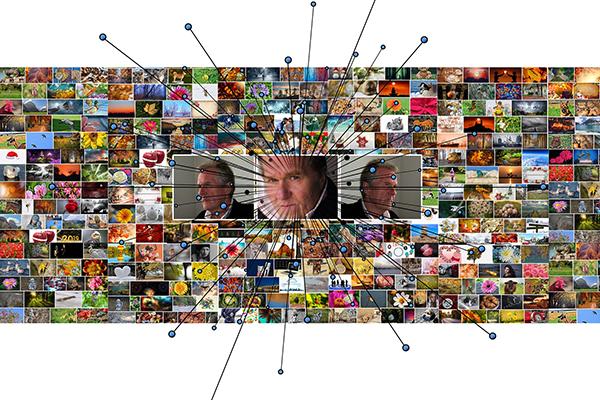Satan mastered it before the Internet did.

The other day I made an online purchase of some hand tools. Within a matter of minutes after I’d clicked “purchase” on the website, I began to notice advertisements for tools popping up on the home page of my Internet browser. What an interesting coincidence, I thought in my innocence, that I’ve only just ordered some tools and now I see these pop-ups!
It took only a moment or two to realize what was happening. As anyone with even a modicum of awareness has come to learn, the information that I had even browsed the Internet for the possible purchase of some wrenches and screwdrivers was applied to a formula that notes my interest in hand tools.
In fact, those pop-ups on my Internet browser are a product of probability theory. It has been observed statistically that if people purchase tools, there’s an increased probability—a better-than-average likelihood—that they will be interested in purchasing other tools.
Without going into the actual statistics that demonstrate this likelihood, the formula that predicts it is a kind of algorithm. Somewhere marketers have determined, statistically, that the average buyer of tools is more likely than those who have not bought tools to purchase other tools.
There’s an interesting spiritual application to this algorithm thing. In the great controversy—the millennia-long war that has been going on between God and Satan—is it not probable that individual humans are subject to probability theory in the temptations they face?
It has long been known that what may be a temptation for one, may not be any temptation whatever for another. In his own wry way, C. S. Lewis turned this belief on its head: “Do not criticize what you have no taste for without great caution.”1 So, is it not likely that through human history Satan has refined—maybe invented—the algorithm to his advantage? We are told that “Satan cannot read our thoughts, but he can see our actions, hear our words; and from his long knowledge of the human family, he can shape his temptations to take advantage of our weak points of character. And how often do we let him into the secret of how he may obtain the victory over us.”2
Truly, in a spiritual sense, each individual on this earth is being watched. There’s no such thing as “when no one is looking”! The timeworn expression, “angels are watching,” has often been used to discourage unwanted behavior. The idea is that God’s angels are looking down from heaven and that they will be grieved when they see God’s law broken.
And, oppressive as it may seem, the traditional Christian view of the judgment at the end of time is accompanied by the idea of, in legal terms, the collection of evidence, an account of each individual sin in a kind of personal lifelong catalog of transgression.
But other angels—those in the legion who serve Satan—are watching closely as well. When a sin is committed, their response is the direct opposite of grieving. Further, the data they collect are taken down in records that, in a kind of cosmic algorithm, assist in how they will “shape . . . temptations to take advantage of . . . weak points of character.”3
In the spirit of Martin Luther’s observation that “the best way to drive out the devil, if he will not yield to text of Scripture, is to jeer and flout him, for he cannot bear scorn,”4 C. S. Lewis wrote The Screwtape Letters to ridicule Satan—and offer a treatise on temptation. In a diverting style, Screwtape, a demon with considerable experience in the craft of temptation, counsels his nephew demon, Wormwood, in how to lead his victim to perdition. The book comprises 31 letters, each emphasizing specific responses to the behavior of Wormwood’s targeted victim.
When, in letter two, Screwtape notes his displeasure in the news that Wormwood’s subject has become a Christian, he adds, however, that “there is no need to despair; hundreds of these adult converts have been reclaimed after a brief sojourn in the Enemy’s camp and are now with us. All the habits of the patient, both mental and bodily, are still in our favor.”5 (The telling emphasis on “habits” is truly Screwtape’s own.)
The temptations that each of us faces at any stage in our lives are cruelly calculating. They are custom-made to our behaviors, our habits, and our actions from our past. The devil is literally in the details. And, as created, sinful human beings, we would be hopelessly beaten, except . . .
Jesus, the incarnated Son of God, was one day led by the Holy Spirit into the wilderness on a mission to defeat temptation. This was a pivotal test in the history of humankind.
For Satan, this direct confrontation was unlike any other he had experienced—or will experience—with any other human being. Because Christ was sinless—had no sinful data on which Satan could calculate—the great deceiver could draw only on a more general algorithm of temptation based on all the rest of sinful human nature.
Millard Erickson points out that the tests Jesus faced there in the wilderness were each based on a desire that’s natural to humanity: “the desire to enjoy things, . . . the desire to obtain things, . . . [and] the desire to do things.”6 None of these is essentially sinful.
But, Erickson adds, “There are proper ways to satisfy each of these desires, and there are also divinely imposed limits. Failure to accept these desires as they have been constituted by God and therefore to submit to divine control is sin. In such cases, the desires are not seen in the context of their divine origin and as means to the end of pleasing God, but as ends in themselves.”7
There, out in that vast wilderness waste, Jesus withstood the direct test and defied the most sinister of all algorithms. And the solution, for us all, adds up to this: only through Christ may we withstand the devil and the details.
1 C. S. Lewis, Of Other Worlds (New York: Harcourt, 1966), p. 72.
2 Ellen G. White, The Faith I Live By (Washington, D.C.: Review and Herald Pub. Assn., 1958), p. 327.
3 Ibid.
4 Martin Luther, C. S. Lewis, The Screwtape Letters (New York: HarperCollins, 1942), p. xiii.
5 Ibid., p. 5, emphasis in the original.
6 Millard J. Erickson, Introducing Christian Doctrine (Grand Rapids, Mich.: Baker Academic, 2001), p. 191.
7 Ibid.








